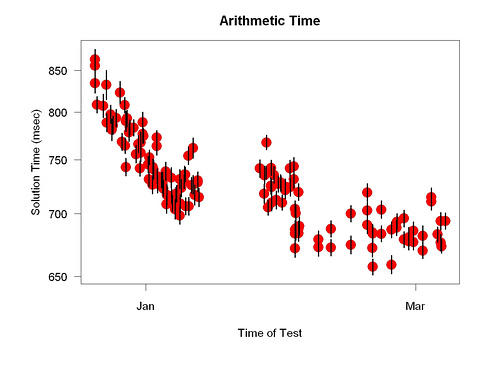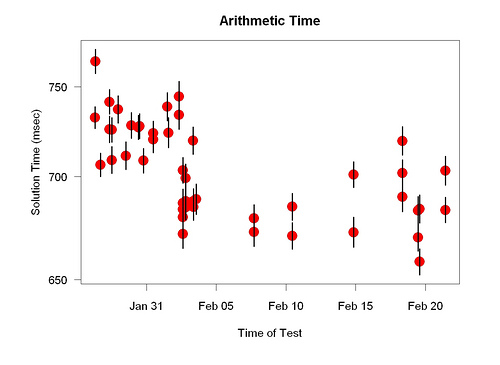For a few months, I’ve been measuring how well my brain is working using arithmetic problems. Each test session includes 100 simple problems (3+4, 7-0, 4*8) divided into 5 blocks of 20. I type the last digit of the answer as quickly as possible. I got the idea from Tim Lundeen, who got better on a similar task when he increased his DHA intake. My performance on an earlier version of this task was improved by flaxseed oil.
I’ve blogged about this. The virtues of this test include: 1. Fast. Takes only a few minutes. 2. Portable. Requires only a laptop. 3. Many possible answers (1, 2, 3, etc.). This reduces anticipation errors. 4. Many numbers (reaction times) per test. This allows me to get a measure of variability for each session and can correct for the difficulty of the problem. Aspects with room for improvement include: 1. Speed/accuracy tradeoff. Accuracy isn’t fixed. Depending on how accurate I want to be, I’ll go faster or slower. (I aim for 95% correct.) 2. No complex actions. The most enjoyable games have a motor-skill aspect that this task does not.
Here’s the data so far.

The big gap happened because I moved from Beijing to Berkeley. The most fascinating result, of course, is the sudden drop on February 2. Here is a close-up.

The drop was easy to notice. All of a sudden I was faster (and only slightly less accurate). The first test with better performance took place while my landlady, who lives upstairs, was practicing piano. Usually it’s quiet when I test myself. My first thought was that the music had caused the improvement. But it persisted so long after the music had stopped that the music couldn’t be the cause.
Part 2: I think I know what caused it. But there is a big problem with my explanation.
There’s some joke to be made here involving the stereotype of the Chinese being good at math…hey, wait, didn’t you say that the Chinese language made math easier and that you’ve been learning Chinese?
Haven’t you failed to account for the possibility that you’re getting better at this? This seems like an easily trainable exercise. People who have to do arithmetic frequently are often better at it: for instance, waiters in Germany don’t use cash registers to calculate bills, and they are extremely fast, while even extremely intelligent mathematicians can be slow at common arithmetic because they don’t do it frequently.
Note that you don’t improve at all during your move, despite the fact that you were likely taking DHA still. This bolsters my hypothesis.
The first graph shows that I had stopped improving when the sudden drop occurred.